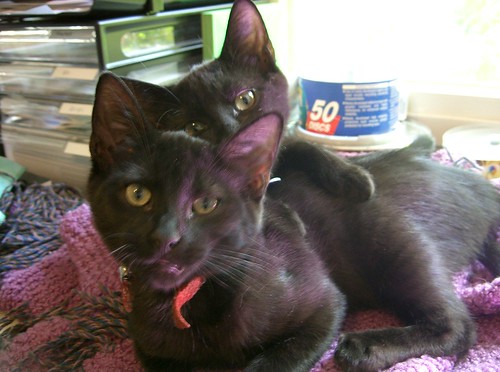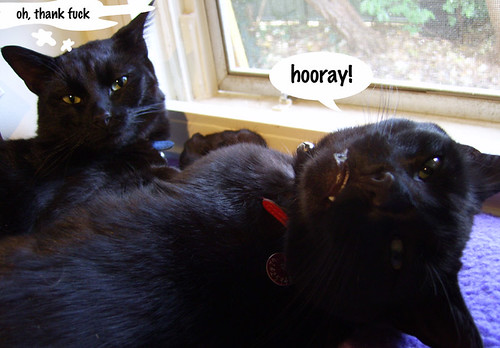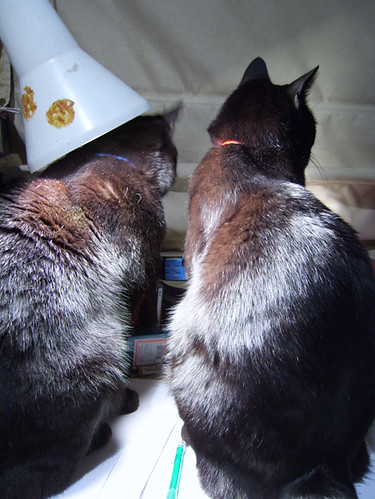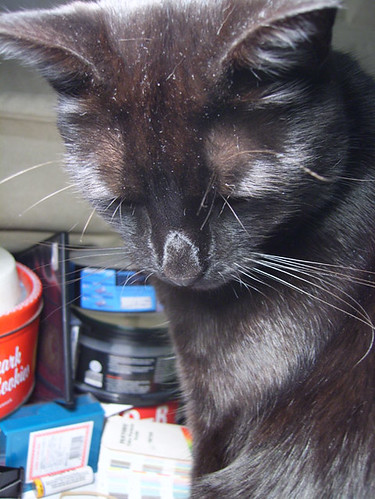Wonderful because I realised well into the book that I had actually read it before, years ago, and I also realised that I'm at the right age to read White's books now; when I was young at at uni I enjoyed them, but now I'm appreciating them, and it's a big difference.
Frustrating, because it is not a book that can be broken up into manageable chunks to discuss in stages. This is possibly why discussion of the book at PWRG hasn't been as vibrant as when we read The Vivisector, which had a narrative that flowed in a straight line from the birth to the death of one individual. In TSM, we are reading about two individuals snared in a dissoluble partnership; perhaps really one life from two perspectives.
The structure of the book, as I mentioned in one of the PWRG threads, cleverly reflects this dichotomy of separateness and wholeness: There is chapter one, the 'introduction', akin to a Greek chorus, of the two women setting the scene and introducing the main players, twins Waldo and Arthur. They are seen as two friends, but White is already playing with a sense of unity permeated by discord; it turns out that they are quite new friends, and feel nagging doubts about the longevity of their relationship. This is a very short chapter, or, when you think about it, a 'normal' length of chapter. So far, so good.
Chapter two is the longest chapter of the book, and covers Waldo's perception of his and his brother's life. In my copy it takes up 191 pages of 317 pages in total. Chapter three, Arthur's chapter, is only 80 pages. Already White is giving us a physical clue to his themes. Waldo is full of self-importance. He feels he has a lot to say, although in reality he never gets around to saying it. Arthur has a lot to say too, but he doesn't need as much room as Waldo. And chapter four is short but deep, pulling strands together, and giving a balance that three chapters would not have managed. And it takes the essence of the book -- the existence of an inner life in the most mundane of surroundings -- outside of the twins, making it universal by applying it to Mrs Poulter. His last line sums it all up:
Then she turned, to do the expected things, before re-entering her actual sphere of life.
I don't know about you, but I sighed happily as I closed the book on that ending. But that's not to say I was as content during the rest of the book.

To be honest, I haven't got the time to give this post the depth I'd like to give it; I could write an essay on it happily. So I'm going to give you something a bit silly to illustrate a few of my thoughts. By the time I'd reached the end of the book I realised that Waldo and Arthur were very similar to two other characters in my life:

Mr Pooter and Mr Padge, my cats. In fact, if I'd been reading this book when I got my cats, they would now be Waldo and Arthur. But we were reading Diary of a Nobody. I can't keep the names for my next two cats, because it just wouldn't work. These two really ARE Waldo and Arthur. Let me demonstrate:

See that? Mr Pooter (on the left, with a blue collar), is (relatively) small, thin and light. Mr Padge (on the right, smiling, with a red collar), is large and plump and heavy. I gave them the above captions last year some time for a joke, but they really do reflect the personality differences between these twin boys.

Waldo/Pooter is the more 'intellectual' of the two. At least, he likes to think so. Saddled with a ridiculous name, he tries to make up for it by being smart and aspires to be respected for his intellect and creative potential. Of the two boys, he is the 'ideas man', but his ideas rarely lead him far. He likes to think of himself as well-travelled, whereas he never strays further than the next door neighbour's house. When the two boys fight, even playfully, he's the one that starts it, and he's also the one who takes it just that bit too far, thanks to his spiteful nature. When he sits, he sits tightly furled, with elbows poked out as if warning you away, and claws anchoring him firmly. He likes to get under the bedcovers, under my knees, and if I move he digs a claw into my flesh. I tend to think of him as my emo cat, because he's never happy, always walking about with an air of discontent and hard-done-by-ness, even though his life is one of absolute luxury and simplicity. He is sure that whatever is happening to him, he feels it more than other people, and he deserves better. He has hardly any physical voice, and his purr is so soft as to be almost inaudible, but he damn well makes himself heard when he wants to be heard. He can be insufferably smug if given a treat that his brother misses out on. He views his brother with a air of disdain and jealous that is underpinned by a desperate need for his love. He likes to lick his brother's arse. Literally.

Arthur/Padge is a very large, ungraceful cat with a warm, sunny disposition. He roams the neighbourhood widely and has friends everywhere who know his name. He likes to talk to you, with a loud, growly voice, and purrs like a tractor. His purr can take over a room with its joyfulness. He lies across a room or the entire hallway, stretched out openly, expecting a tummy rub if you have to step over him. He comes up to you and bangs against your leg with a hard headbutt, asking blunt questions about when dinner will be ready. He likes marbles. If he had a pocket, it would have at least one marble in it, but will instead chase one happily for hours over a wooden floor and then cradle it in his paw as he sleeps. He rarely starts a playfight, and tolerates his brother's aggressiveness, allowing him to win fights, even though he is obviously bigger and stronger. He allows Waldo/Pooter to lick his arse, but his tail lashes hard while it happens. I like to think he dances clumsily around the house when I'm not home, just for the joy of it.

They are co-dependent, my two pusses. They communicate with a sniff, a twitch, a tap. Often you will put one down next to the other, and they will look at each other and leap away in opposite directions disdainfully. When no-one else is in the house they will curl up together on the bed, comforted by the other's heartbeat. They have never been apart, and their owners live in dread of one dying in an untimely fashion, because of the loneliness the other will feel -- or would it be liberation?


Cats aside, my last point is that I really felt for Waldo, in the same way that Arthur did -- we see right through his self-important blusterings and blunderings, and wish he could fulfil the potential he feels he has. But in the end it's Arthur who has the potential, and the knowledge, and the sensitivity. His small chapter is stuffed with more meaning, layers, and questions than any of Waldo's meaningless meanderings. I admire and respect Arthur, but I relate to Waldo -- he embodies the fears of any person aspiring to be creative in the face of people who are naturally creative. They are White's fears, and this book, I think, is his way of acknowledging the struggle in many people, maybe in all people. Arthur and Waldo are one person -- White -- and also one nation -- Australia -- struggling to find its feet in the world. A huge pattern, a mandala, made up of many small, busy elements, pulled into one large shape, only discernable if you stand back to take a look.
Oh! So many ideas, so little time to gather my fuzzy braincells. I'll have to leave it there, but please have a chat with me about this here, or take it over to PWRG and let's get the discussion happening...
3 comments:
&D, this is such a fantastic post about TSM. I started reading it way later than the PWRG schedule, so am still only half way through, but i can already tell that your are right on the money with your gorgeous analogy! As far as i can tell so far, TSM is pure dichotomy. it's a dichotomy about dichotomy about dichotomy. it's about each of the twin characters being a sum of two parts individually and then the twins themselves being a metaphor for the two parts of the writer and the reader and then the life cycles that happen as the results of choices (to be or not to be). Even Terminus Rd is a character in the book that could signify that double-sidedness to life, either on one side or the other. or you're going to or from. like i said, i haven't finished it yet, so i could be off on a completely different tangent, but i'm lovin' it anyway.
PS - i haven't gone to PWRG 'cos there's a serious spoiler alert there and i don't want to spoil it too much.
"Mr Padge (on the right, smiling,"
'smiling' ?
Only a mother would make that claim.
It is clearly a vampiric snarl and he is The Dark Prince Of Cats.
... and Patrick White ?
I think he liked cats.
(great photos though, AD)
Now you've got me all interested and I'm going to have to borrow it from the library. Thanks Ducky.
Post a Comment